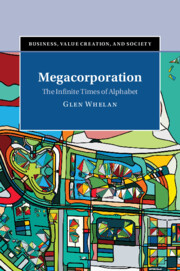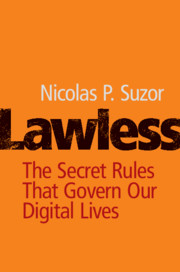Refine search
Actions for selected content:
23 results
Public Interest in Dermatological Issues After the 2023 Türkiye Earthquake: A Comparative Google Trends Analysis
-
- Journal:
- Disaster Medicine and Public Health Preparedness / Volume 19 / 2025
- Published online by Cambridge University Press:
- 03 June 2025, e136
-
- Article
- Export citation
8 - Conclusion
-
- Book:
- Regulating Access and Transfer of Data
- Published online:
- 06 April 2023
- Print publication:
- 13 April 2023, pp 239-250
-
- Chapter
- Export citation
3 - Competition Law
-
- Book:
- Regulating Access and Transfer of Data
- Published online:
- 06 April 2023
- Print publication:
- 13 April 2023, pp 68-94
-
- Chapter
- Export citation
4 - General and Sector-Specific Regulations
-
- Book:
- Regulating Access and Transfer of Data
- Published online:
- 06 April 2023
- Print publication:
- 13 April 2023, pp 95-150
-
- Chapter
- Export citation
2 - The Data-Driven Economy
-
- Book:
- Regulating Access and Transfer of Data
- Published online:
- 06 April 2023
- Print publication:
- 13 April 2023, pp 6-67
-
- Chapter
- Export citation
A Capabilities Framework for Dynamic Competition: Assessing the Relative Chances of Incumbents, Start-Ups, and Diversifying Entrants
-
- Journal:
- Management and Organization Review / Volume 19 / Issue 1 / February 2023
- Published online by Cambridge University Press:
- 16 December 2022, pp. 141-156
-
- Article
-
- You have access
- Open access
- HTML
- Export citation
9 - Open-Source AI Platforms and the Cyber Security Law
- from Part II - Impact on Artificial Intelligence
-
- Book:
- AI Development and the ‘Fuzzy Logic' of Chinese Cyber Security and Data Laws
- Published online:
- 16 December 2021
- Print publication:
- 16 December 2021, pp 260-328
-
- Chapter
- Export citation
1 - The Cult of Dual-Class Stock in the Era of Big Tech
- from Part I - Putting Dual-Class Stock into Context
-
- Book:
- Founders without Limits
- Published online:
- 29 October 2021
- Print publication:
- 11 November 2021, pp 15-69
-
- Chapter
- Export citation
The hidden impacts of the ICC: An innovative assessment using Google data
-
- Journal:
- Leiden Journal of International Law / Volume 34 / Issue 3 / September 2021
- Published online by Cambridge University Press:
- 14 May 2021, pp. 729-747
-
- Article
-
- You have access
- Open access
- HTML
- Export citation
From Google Doodles to Facebook: Nostalgia and Visual Reconstructions of the Past in Nigeria
-
- Journal:
- African Studies Review / Volume 64 / Issue 3 / September 2021
- Published online by Cambridge University Press:
- 14 April 2021, pp. 498-522
-
- Article
- Export citation
3 - Alphabet
- from Part I - The Birth of a Megacorporation
-
- Book:
- Megacorporation
- Published online:
- 06 April 2021
- Print publication:
- 08 April 2021, pp 43-68
-
- Chapter
- Export citation

Megacorporation
- The Infinite Times of Alphabet
-
- Published online:
- 06 April 2021
- Print publication:
- 08 April 2021
Suicide and the agent–host–environment triad: leveraging surveillance sources to inform prevention
-
- Journal:
- Psychological Medicine / Volume 51 / Issue 4 / March 2021
- Published online by Cambridge University Press:
- 05 March 2021, pp. 529-537
-
- Article
-
- You have access
- Open access
- HTML
- Export citation
Community movement and COVID-19: a global study using Google's Community Mobility Reports
-
- Journal:
- Epidemiology & Infection / Volume 148 / 2020
- Published online by Cambridge University Press:
- 13 November 2020, e284
-
- Article
-
- You have access
- Open access
- HTML
- Export citation

Lawless
- The Secret Rules That Govern our Digital Lives
-
- Published online:
- 22 June 2019
- Print publication:
- 18 July 2019
Testing the Validity of Automatic Speech Recognition for Political Text Analysis
-
- Journal:
- Political Analysis / Volume 27 / Issue 3 / July 2019
- Published online by Cambridge University Press:
- 19 February 2019, pp. 339-359
-
- Article
- Export citation
WWGD (What would Gwyneth do?)
-
- Journal:
- Canadian Journal of Emergency Medicine / Volume 20 / Issue 6 / November 2018
- Published online by Cambridge University Press:
- 10 October 2018, p. 1
- Print publication:
- November 2018
-
- Article
-
- You have access
- HTML
- Export citation
Part XXVIII - Shakespeare and Media History
-
-
- Book:
- The Cambridge Guide to the Worlds of Shakespeare
- Published online:
- 17 August 2019
- Print publication:
- 21 January 2016, pp 1907-1974
-
- Chapter
- Export citation
277 - Shakespeare and Online Video
- from Part XXVIII - Shakespeare and Media History
-
-
- Book:
- The Cambridge Guide to the Worlds of Shakespeare
- Published online:
- 17 August 2019
- Print publication:
- 21 January 2016, pp 1970-1974
-
- Chapter
- Export citation
Chinese Internet Business and Human Rights
-
- Journal:
- Business and Human Rights Journal / Volume 1 / Issue 1 / January 2016
- Published online by Cambridge University Press:
- 13 November 2015, pp. 139-144
-
- Article
-
- You have access
- HTML
- Export citation

